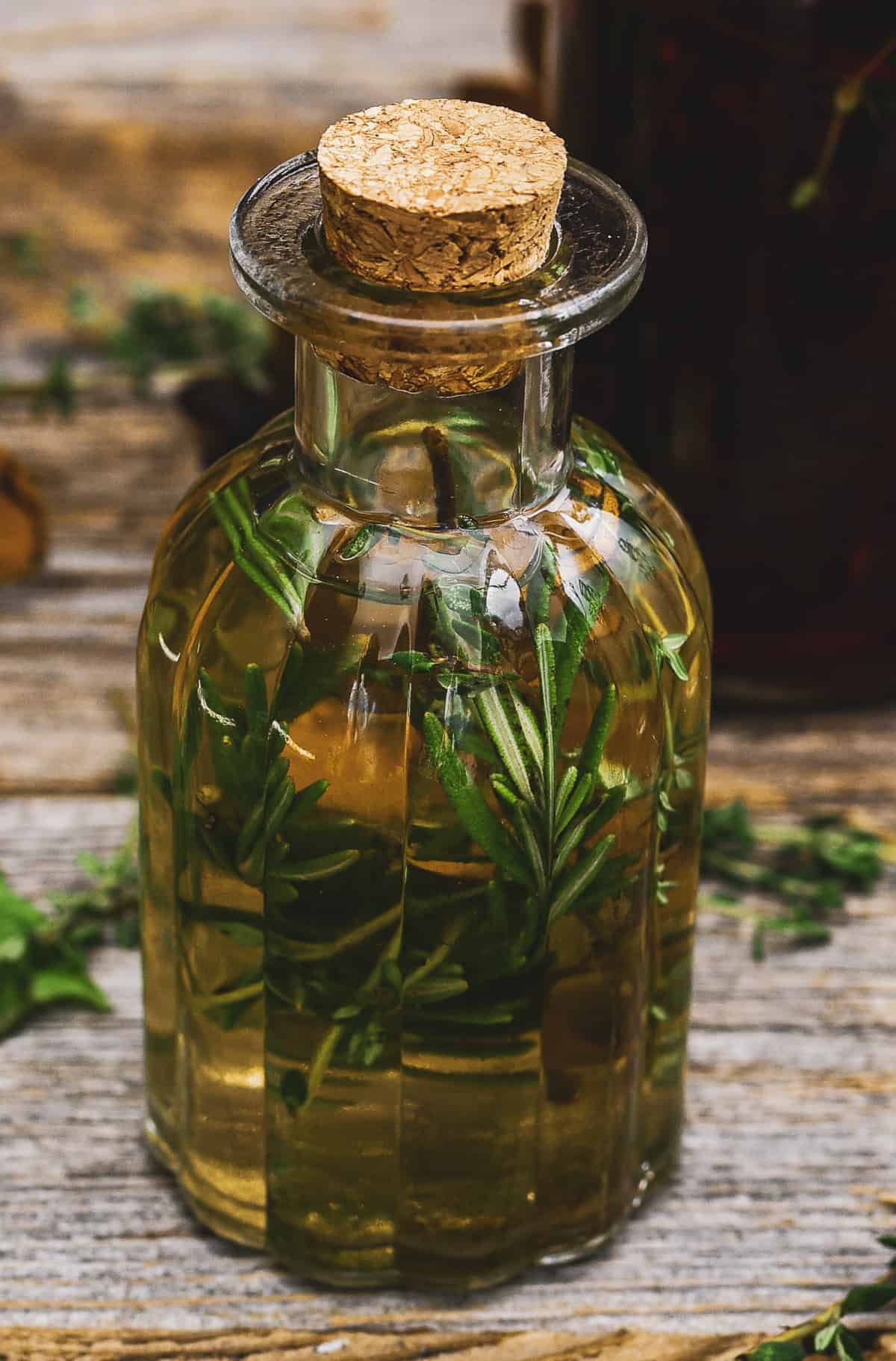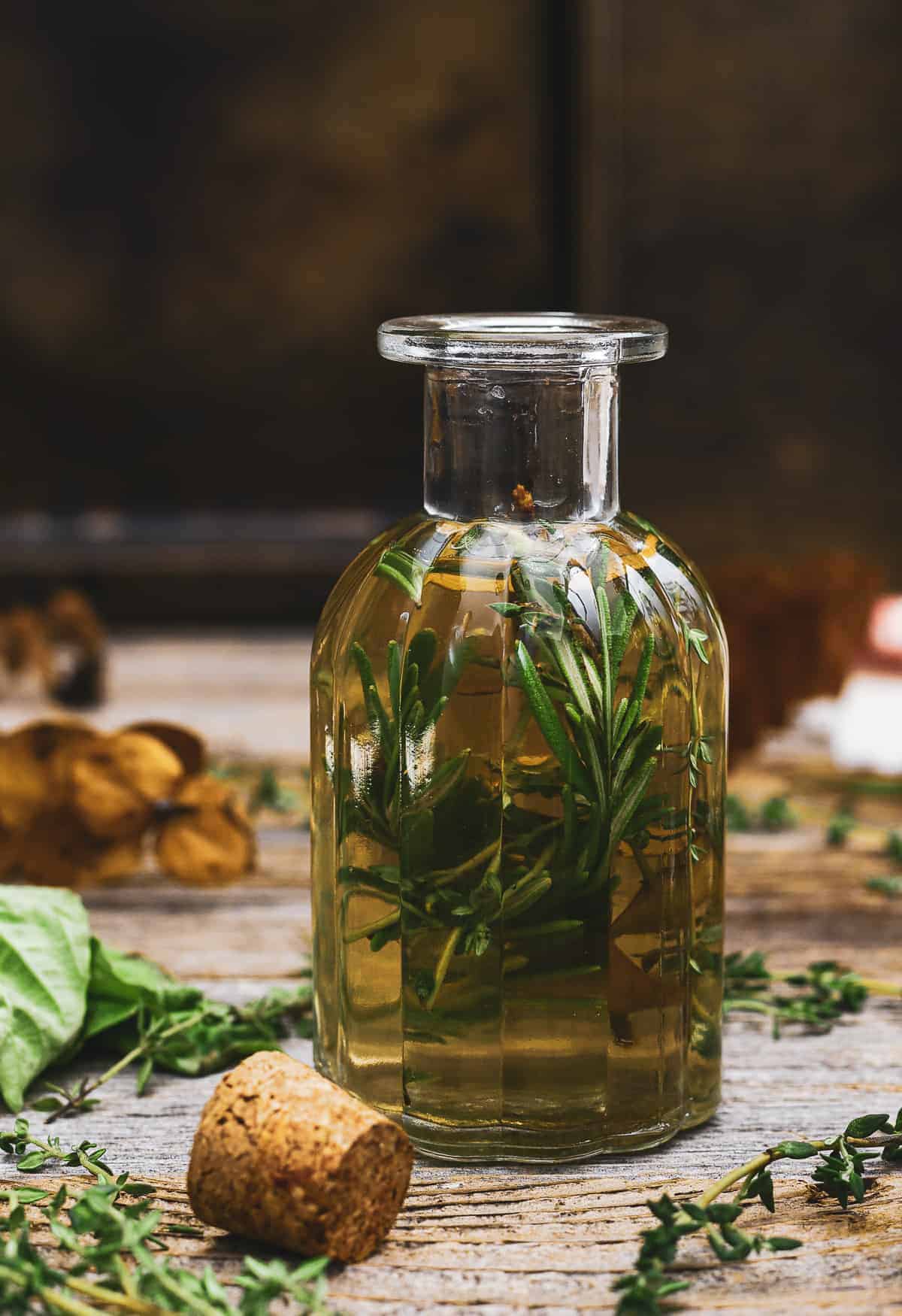Herb vinegar is so easy to make, versatile, and cheap. Perfect for marinades, salad dressings, and they make beautiful gifts.
No doubt you’ve seen herbal vinegar in those fancy magazines or some snobby food boutique. They’re usually in cool little bottles plugged with a cork and cost as much as your car.
Let’s be honest. We’re essentially talking about crushed up weeds stored in sour liquid for 2 weeks. But, I guess that doesn’t sound quite as hoity-toity and probably wouldn’t sell.
That being said, herbed vinegar is great to always have on hand and it’s freaking cheap to make. It adds amazing flavor and excitement to your favorite healthy vegan and plant-based recipes. And, if you put it in a fancy bottle you’ve got a cheap, but lovely, gift.
My favorite ways of using flavored vinegar are when I’m marinating tofu, making salad dressings, or vegan potato salad.
White and rice vinegars are very mild-tasting, making a flavorful base that doesn’t overwhelm such delicate herbs as dill and tarragon. Stronger herbs such as rosemary and thyme stand up well to cider or wine vinegar.

What Types Of Vinegar Can I Use
- Apple Cider Vinegar: it’s made from apple cider, is a good match for strongly flavored herbs and spices. I recommend using a good organic brand like Bragg’s with “the mother”
- White Wine Vinegar: White wine vinegar are great for culinary herbs like dill, basil, tarragon, chervil, and lemon balm.
- Red Wine Vinegar: Red wine vinegar is rich in flavor and pairs well with more savory herbs like sage, thyme, parsley.
- Champagne Vinegar: champagne vinegar is great for softer and floral herbs like dandelion or lavender.
- Rice Vinegar: rice vinegar or “rice wine vinegar” is sweet and mild and good for delicate herbs and spices.
- Balsamic Vinegar: balsamic vinegar is one of my favorite and great for making salad dressings, marinades, and glazes. A good choice of herbs is thyme and rosemary.
- White Vinegar: white vinegar is also an option but some people find it to be a bit harsh.

What Kind Of Herbs Can I Use
It all depends on what flavor you’re going for and the type of vinegar you’re using. The best thing you can do is just experiment. But, here are some options to get you started.
- Tarragon and garlic (whole cloves)
- Dill weed
- Chili peppers
- Fresh basil
- Lemon balm, lemon zest, or lemongrass
- Parsley, sage, rosemary, and thyme
- Bay leaves
- Fennel (works well in rice vinegar)
- Lavender is excellent in apple cider vinegar
- Chives
- Mustard seed
You can also make fruit vinegar and it’s AWESOME! My favorites are raspberries, strawberries, apples, and pineapple. Simply add 1 cup of fruit to 2 cups of vinegar.

Making Herbal Vinegar for Cooking, Skin Care, and Clean-Up with Kami McBride
FAQ
What flavors go with vinegar?
What is an herbal vinegar called?
How do you make herbal tinctures with vinegar?
How long does herb infused vinegar last?
What herbs go well with white wine vinegar?
White Wine Vinegar: White wine vinegar are great for culinary herbs like dill, basil, tarragon, chervil, and lemon balm. Red Wine Vinegar: Red wine vinegar is rich in flavor and pairs well with more savory herbs like sage, thyme, parsley. Champagne Vinegar: champagne vinegar is great for softer and floral herbs like dandelion or lavender.
What can be used as a substitute for white wine vinegar?
Champagne vinegar is another mild wine-based vinegar. Fermented rice and has a sweet and mild flavor. It is mainly used in Asian cuisine. Apple cider vinegar made from fermented apples, apple cider vinegar. All being a great option.
What kind of vinegar goes with sage & thyme?
Red Wine Vinegar: Red wine vinegar is rich in flavor and pairs well with more savory herbs like sage, thyme, parsley. Champagne Vinegar: champagne vinegar is great for softer and floral herbs like dandelion or lavender. Rice Vinegar: rice vinegar or “rice wine vinegar” is sweet and mild and good for delicate herbs and spices.
Can you make herbal vinegar with fresh or dried herbs?
You can make herbal vinegar with fresh or dried herbs, and with room temperature or heated vinegar. Hot vinegar is the best method for dried herbs and is ready to use in just a week. However, you’ll get a better product with a more balanced flavor if you use fresh herbs and room temperature vinegar.
